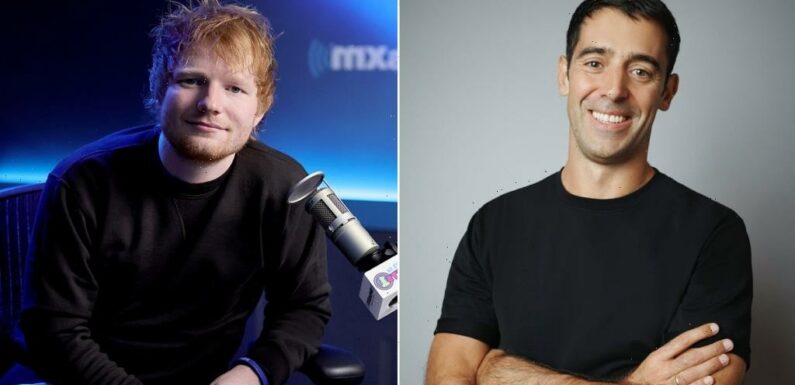
Not much is left to chance in an Ed Sheeran campaign these days, but his label deal actually sprang from a random encounter.
Call it a tale of two Eds: Ed Howard, then head of A&R for Atlantic imprint Asylum Records, first met the superstar singer-songwriter at a 2010 Bruno Mars gig in London. They got chatting and Sheeran, who famously didn’t have his own place at the time, ended up crashing on Howard’s couch and playing him some of his songs.
Howard duly signed him to Asylum – at a time when most labels had already passed on Sheeran at least once – and has been there every step of the way as Sheeran became one of the most successful artists in the world.
Howard has also stepped up – he’s now co-president of Atlantic U.K., alongside Briony Turner – and has a roster bursting with hit artists including Anne-Marie, Maisie Peters, Joel Corry and Tion Wayne. He continues to A&R Sheeran, and is recognized in Variety’s Hitmakers issue for his work on Sheeran’s monster hit, “Shivers.”
To celebrate, Variety caught up with Howard in London to talk about his working relationship with the man he calls “the best songwriter of this century.”
You’ve worked with Ed for a long time now. How much A&R-ing does he actually need these days?
Ed’s always asked people for their opinions, not just someone who’s nominally working as an A&R. He plays a lot of music to a lot of people – friends, family, musicians, songwriters – in the run-up to decisions he needs to make musically. It’s a real strength of his. He’s very open-minded and inquisitive, and that’s really helped him in his career. There’s a big part of A&R which is about encouragement and being a sounding board and Ed’s coming with ideas all the time. When he asks your opinion, he’s asking it genuinely of people that he trusts, it’s not lip service. He’s always appreciative and respectful, but very much able to say, “No, I’ve made this decision for these reasons,” and that’s a very healthy trait.
Do you wish all artists were like that?
It is a bit of a dream, which doesn’t mean it’s easy or smooth sailing, because how could it be, otherwise everyone would do it! It’s definitely a career highlight and a huge pleasure – he’s a lovely man.
Ed’s been the U.K.’s most consistent hitmaker of recent years. What’s his secret?
He’s writing songs at all times. If you’re that focused on a particular craft and you bring that much talent to it – he says it’s not talent at all, he says he’s just done it loads! Obviously, I don’t agree with that, but he has worked on it. If you’re trying to make music that travels round the world, you do have to write a certain amount of songs to find three or four exceptional ones. You’ve got to put the work in, in terms of trying different things, being open-minded and pushing your boundaries. And obviously there’s a huge component of innate musical talent and understanding that he brings to it.
He also collaborates with a huge range of artists…
He went from a Christmas record with Elton John through to Fireboy DML, Taylor Swift, Camila Cabello and then “Bad Habits” at the BRITs with Bring Me the Horizon… That’s a unique cross-section of artists. I don’t think anyone else could touch those artists credibly. It’s remarkable.
Do you tailor your A&R approach to each artist?
Absolutely. You’ve got to think what each artist needs, and it changes so much. Ed was 18 when I met him, and he needs different things now to then. Often, over time, artists naturally need less input. They grow more confident, meet more people and make more decisions about people they do and don’t want to work with. When they start, often we’re making introductions and helping that person. Everyone needs different levels of encouragement versus reality versus ideas and help musically versus editing. But we definitely try and keep it positive, because we want artists functioning in a healthy headspace and knowing they’ve got the support of their team.
Where does music discovery happen these days?
On a lot of different platforms. It’s important to understand the potency of friend recommendation and peer-to-peer sharing, and that side of it that happens before and during the work that artists do with TikTok, Shorts, Reels and DSPs. That kind of activity is super-important in terms of musical discovery and understanding that it’s not just about a song. If an artist is trying to build their fanbase, it won’t be the song that creates the fan on its own. It’ll be something else that the artist does, like a piece of content that goes viral. If you’re getting it right, the music creates a backdrop for other things. And I don’t think that devalues the music in any way. It just shines a light on the creator at the center of the conversation. If you think about Madonna or Elvis Presley, they’re not just about the music, and yet they’re timeless, immortal musicians.
What’s the most pressing music industry issue that your field is facing right now?
[The U.K. has] got to get back to music that [we can] export. Now I’m seeing our artists travel again, I see Mahalia, Maisie Peters and Fred Again playing sold-out shows and think, “Clearly, [the pandemic] cutting that off for a couple of years wasn’t helpful, but actually when they’re on the ground there, it still feels really exciting and meaningful.” So I’m hoping that, even though we’ve got competition from amazing musicians from Latin America, Korea and other parts of the world, we can and we will get back to that.
Read More About:
Source: Read Full Article